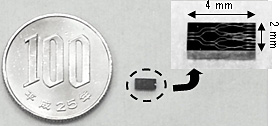Successful Miniaturization of Next-generation Optical Waveguide Chip
- Realization of higher density integration -
Furukawa Electric has succeeded in reducing the chip size in next-generation silica-based optical waveguide circuits(note 1) (hereinafter called, PLC) to less than one tenth of the size of conventional chips. This has made it possible to realize the high-density integration of the circuits.
Two presentations related to this technology will be given at OFC2014 to be held in March this year, the largest international conference in the optical communications sector in the world. These presentations will be on “Ultra-small coherent mixers” and “Low loss connection technologies for super high refractive index PLC (hereinafter called “super high Δ PLC”).”
Background
In recent years, the arrival of smartphones and the spread of moving picture distribution and social networks, etc., have resulted in an explosive increase in communications traffic. In order to realize this advanced information-oriented society, it is necessary to realize ultra-high speed and large-capacity transmission.
The introduction of the optical digital coherent system(note 2) is being accelerated as a step to achieve this ultra-high speed and large-capacity transmission and there is a requirement for the provision of optical components and terminal equipment to achieve this. There are also demands for more compact, higher functioning and lower costing optical devices and in order to satisfy these demands, it is becoming necessary to develop innovative technology that goes beyond the design limits for conventional PLC.
Details
By changing the composition of the silica-based glass that forms the base of the PLC, Furukawa Electric has developed super high Δ PLC technology that greatly increases the refractive index difference between the core and the cladding and has succeeded in the reduction of chip size to less than one tenth of that of conventional items. This development has made it possible to achieve the higher density integration of circuits.
The super high Δ PLC technology at the base of this was awarded the Best Paper Award at the OECC2013 optical communications related international conference held in Kyoto in July last year. From now on, in addition to proceeding with demonstration testing including regarding modularization, we also plan to work to further improve quality.
Merits
On conventional PLC, GeO2 is added to the core part to raise the refractive index above that of the cladding so that light is confined inside the core for the transmission.
In order to make the circuits more compact and to have higher density integration, it is necessary to increase the amount of GeO2 to increase the relative refractive index difference between the core and cladding to further strengthen the confinement of the light. However, it is known that when the amount of GeO2 added is increased, the glass structure becomes unstable and problems occur with the manufacturing and quality.

We therefore developed a super high Δ PLC with a relative refractive index difference of 5% and above by adding ZrO2, which has a high refractive index, to the core. When this was applied to a coherent mixer, we realized a compact size that was less than one tenth of that of conventional items. This has made it possible to achieve the further miniaturization of coherent receivers.
Future prospects
The next step in this development will be development to apply the super high Δ PLC technology developed this time to actual optical devices. In addition to proceeding with demonstration testing that will include modularization, we will also aim to further improve quality and will make a contribution to the realization of next-generation high-speed optical communication networks.
(note 1)An optical component that is formed when a core that forms the path for light in the same way as in optical fibers is embedded in cladding that is made from silica glass that is deposited on to a planar substrate made of silicon, etc. The functions of various optical components that were made using optical fiber and micro optical components can all be achieved on one single chip. They have advantages for miniaturization, using multiple channels and high functionality and various PLC components have been put in use, including optical splitters and AWG.
(note 2)A transmission method in which locally oscillated light is made to interfere with the phase modulated signal light at the receiving side in order to demodulate the signal to intensity modulation and communicate information. Coherent detection has been put to use in wireless communication for some time, but in optical communication, the advance of digital signal processing technologies in recent years has led to the digital correction of the instability of optical devices and the practical use has become possible.







 Share
Share Tweet
Tweet Share
Share